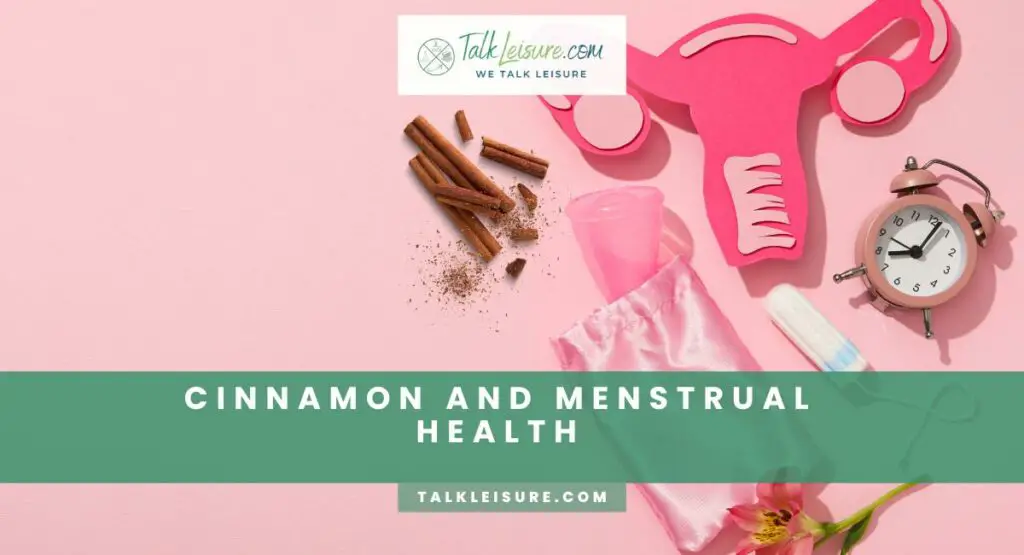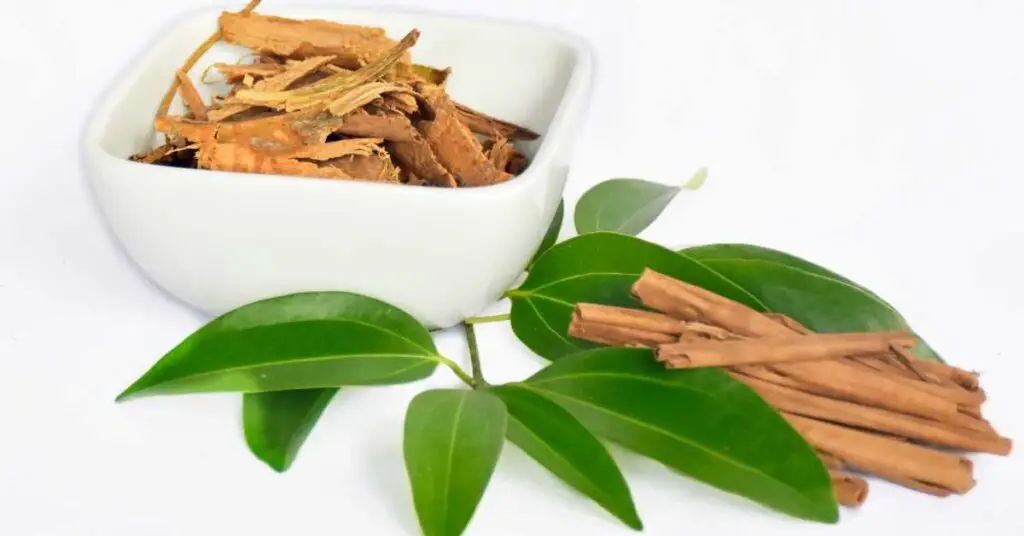Cinnamon, a beloved spice cherished for its rich flavor and aromatic essence, has transcended its culinary role to emerge as a potential ally in women’s health, particularly menstrual well-being.
This aromatic spice, derived from the bark of Cinnamomum trees, has garnered attention for its reported anti-inflammatory and anti-spasmodic properties.
Recent studies have explored the potential benefits of cinnamon in addressing menstrual discomfort and irregularities, offering a natural alternative for women seeking relief.
As we delve into the intricate connection between cinnamon and menstrual health, a promising narrative suggests that this age-old spice may hold therapeutic potential for women navigating the complex landscape of menstrual challenges.
Cinnamon And Its Health Benefits

Cinnamon is a commonly used spice that has been shown to possess several health benefits.
It contains anti-inflammatory and antioxidant properties that can help improve overall health and well-being.
Some studies have also suggested that cinnamon may help manage menstrual discomfort, such as cramps and pain.
Additionally, cinnamon has been found to positively affect blood sugar levels and could be beneficial for individuals with type 2 diabetes.
It may also reduce the risk of heart disease by lowering cholesterol and blood pressure levels.
Furthermore, cinnamon has been found to have antibacterial and antifungal properties, making it helpful in fighting infections.
Incorporating cinnamon into your diet can be as simple as sprinkling it on your morning oatmeal or adding it to your afternoon coffee.
Cinnamon is a valuable addition to any diet with its potential health benefits.
Cinnamon In Women’s Health

Cinnamon has long been recognized for its potential benefits in women’s health.
It possesses anti-inflammatory properties that can help alleviate menstrual pain and cramps.
Some studies have also suggested that cinnamon may aid in managing menstrual irregularities and improving fertility.
Additionally, cinnamon has been found to have a positive impact on blood sugar levels, which can be particularly useful for women with polycystic ovary syndrome (PCOS).
Another potential benefit of cinnamon for women’s health is its ability to combat infections.
Cinnamon has been found to have antibacterial and antifungal properties, making it helpful in fighting vaginal infections and other health issues.
Incorporating cinnamon into your diet can be as simple as adding it to your morning coffee, oatmeal, or smoothie.
However, it’s important to note that cinnamon should not be used as a replacement for medical treatment.
Always consult with a healthcare professional before adding any supplements to your regimen, especially if you are pregnant or have an underlying health condition.
What Does Cinnamon Do In A Woman’s Body?
Cinnamon is a spice that has been used in traditional medicine for centuries.
Regarding women’s health, cinnamon contains potent compounds with anti-inflammatory properties that can help alleviate menstrual pain and cramps.
Studies suggest that cinnamon can help with fertility and menstrual irregularities by regulating hormones.
Many women suffer from irregular menstrual cycles or PCOS, which can lead to insulin resistance and high blood sugar levels.
Cinnamon can help regulate blood sugar levels, which is particularly beneficial for women with PCOS. It can also reduce the risk of developing infections, common during menstrual periods.
Incorporating cinnamon into your diet through supplements, teas, or natural sources such as baked goods, smoothies, and oatmeals can help improve women’s reproductive and menstrual health.
However, it is essential to consult your healthcare provider before adding any cinnamon supplements to your diet, especially if you are pregnant or have underlying health issues.
Can Cinnamon Help In Menstruation?

Cinnamon is a spice used for centuries for its medicinal properties.
It contains anti-inflammatory properties that can provide relief from menstrual pain and cramps.
Studies suggest that cinnamon can also help regulate hormones, which is beneficial for women with irregular menstrual cycles or those suffering from PCOS.
Moreover, cinnamon can regulate blood sugar levels and reduce the risk of infections common during menstruation.
While some believe cinnamon tea can help regulate a late period, there isn’t enough scientific evidence to support this claim.
However, studies suggest that cinnamon tea might reduce menstrual discomfort by lowering prostaglandin levels, increasing endorphins, and improving blood circulation.
This can help relieve symptoms like menstrual cramps.
It’s important to note that there’s no clear evidence regarding the impact of cinnamon tea on the menstrual cycle. The observed benefits are more related to easing discomfort rather than influencing the timing of periods.
Can I Take Cinnamon Tea While Pregnant?
When it comes to pregnancy, it’s crucial to be cautious.
There’s no solid research on the effects of cinnamon tea made from Cinnamomum zeylanicum during pregnancy.
However, if the tea is made from Cinnamomum camphora, it could potentially lead to bleeding and changes in the uterus.
A study on mice suggested that cinnamon essential oil might increase the risk of miscarriages, but this doesn’t necessarily apply to humans.
Nevertheless, due to the lack of conclusive studies, pregnant women should avoid cinnamon tea to prevent potential complications.
Always consult with a healthcare professional before trying any herbal remedies during pregnancy.
How To Use Cinnamon For Period?

Cinnamon can be an effective and natural way to alleviate menstrual cramps and discomfort.
There are several ways to use cinnamon during your period, including adding it to your food or drink, taking cinnamon supplements, or using essential oil.
One easy way to use cinnamon is by adding it to your diet.
You can sprinkle cinnamon on your oatmeal, add it to your smoothies, or use it to flavor your baked goods.
You can also make cinnamon tea for several minutes by steeping cinnamon sticks in hot water.
Cinnamon supplements are another option, but be sure to consult with your healthcare provider before taking them.
If you prefer aromatherapy, you can try using a cinnamon essential oil, which can be added to a diffuser or diluted in a carrier oil for topical application.
However, always use essential oils safely and follow proper dilution guidelines.
Ginger And Cinnamon For Period Pain

Period pain is a common issue for many women, and they often resort to taking painkillers to alleviate the discomfort.
However, ginger and cinnamon are natural remedies that reduce menstrual cramps and provide relief.
Ginger and cinnamon have anti-inflammatory properties that help to ease the pain and reduce inflammation during menstruation.
Often combined, they can also help to regulate period cycles and balance hormones.
Making tea is an effective way to use ginger and cinnamon for period pain.
Add a piece of fresh ginger and a cinnamon stick to boiling water and let it steep for about 10 minutes.
You can sweeten it with honey or lemon for a more enjoyable taste.
Alternatively, you can add ginger and cinnamon to your meals, like oatmeal or smoothies, for a continuous dose of the spices.
Ginger Cinnamon Tea Recipe
Ingredients:
- 2 inches of fresh ginger, peeled and thinly sliced
- Two cinnamon sticks
- 4 cups of water
- Two tablespoons of honey (optional for sweetness)
- 1-2 teaspoons of loose black tea leaves or 2 tea bags (optional)
Instructions:
1. Prepare the Ingredients:
- Peel and thinly slice the fresh ginger.
- Gather the cinnamon sticks.
2. Boil the Water:
- Bring the 4 cups of water to a boil in a medium-sized saucepan.
3. Add Ginger and Cinnamon:
- Once the water is boiling, add the sliced ginger and cinnamon sticks to the saucepan.
- Reduce the heat to low and let the mixture simmer for 10-15 minutes. This allows the flavors of ginger and cinnamon to infuse into the water.
4. Optional: Add Black Tea (for a caffeinated version):
- If you desire a caffeinated tea, add 1-2 teaspoons of loose black tea leaves or place two tea bags into the saucepan.
- Steep the tea for 3-5 minutes, depending on your desired strength.
5. Strain the Tea:
- Using a fine mesh strainer or a cheesecloth, strain the tea into a teapot or serving pitcher to remove the ginger slices, cinnamon sticks, and tea leaves.
6. Sweeten (Optional):
- If you prefer a sweetened tea, add two tablespoons of honey to the strained tea and stir until the honey is completely dissolved.
7. Serve:
- Pour the ginger cinnamon tea into your favorite cups or mugs.
- Garnish with a cinnamon stick or a slice of fresh ginger if desired.
8. Enjoy:
- Sip and savor the comforting warmth and delightful flavors of ginger and cinnamon. This tea is perfect for a cozy evening or a soothing remedy for a cold day.
Feel free to adjust the quantities of ginger, cinnamon, and honey according to your taste preferences. This recipe is versatile, and you can experiment with the ratios to find the perfect balance for your palate.
Cloves And Cinnamon Benefits For Female
Cloves and cinnamon are two spices that have been used for centuries for their medicinal properties, particularly in female health.
Both cloves and cinnamon have anti-inflammatory and antioxidant properties that help alleviate menstrual cramps, bloating, and other premenstrual symptoms.
They can also help regulate menstrual cycles and support hormonal balance.
One way to use these spices is to make a tea by boiling water with a cinnamon stick and a few cloves.
You can sweeten the tea with honey or lemon to make it palatable. Additionally, adding these spices to your meals or baked goods can provide a continuous dose of their benefits.
Cloves and cinnamon have been shown to have a positive effect on polycystic ovary syndrome (PCOS), a common hormonal disorder that affects women of reproductive age.
However, it is essential to consult a healthcare professional before using these spices to manage health conditions.
The Benefits Of Using Cinnamon For Menstrual Periods

Cinnamon is a spice used for medicinal purposes for thousands of years, particularly for its potential benefits in menstrual health.
It contains anti-inflammatory and antispasmodic properties that can help alleviate menstrual cramps and reduce heavy bleeding and other premenstrual symptoms.
Some studies have also shown that cinnamon can help regulate menstrual cycles and support hormonal balance.
For those dealing with polycystic ovary syndrome (PCOS), cinnamon may also have a positive effect on managing the condition.
However, consulting with a healthcare professional before using cinnamon as a supplement for any health condition is essential.
Cinnamon can be taken in various forms, such as added to meals or baked goods, as a supplement, or in tea.
Cinnamon tea is trendy and can be enjoyed with honey or lemon for added flavor and potential health benefits.
How To Use Cinnamon To Get Periods?

Cinnamon has been used for centuries for its medicinal benefits, including its potential to help regulate menstrual cycles.
However, it is essential to understand that cinnamon alone cannot induce periods but can help prepare the uterus for menstruation.
One way to use cinnamon for menstrual health is by incorporating it into your diet.
Add it to your meals or baked goods, or take it as a supplement. Another popular method is brewing cinnamon tea, which provides potential health benefits and is a tasty way to consume cinnamon.
To make cinnamon tea, boil water and add a cinnamon stick or powdered cinnamon.
Let it steep for 10-15 minutes, strain the liquid, and enjoy with honey or lemon for added flavor.
However, consulting with a healthcare professional before using cinnamon to manage or alleviate menstrual discomfort is essential.
Does Cinnamon Stop Period?
Cinnamon is a popular spice used for centuries to manage various health conditions, including menstrual discomfort.
However, no scientific evidence suggests that cinnamon can stop periods.
Instead, cinnamon is crucial in regulating menstrual cycles by preparing the uterus for menstruation.
It can also help alleviate menstrual symptoms such as cramps and bloating.
Cinnamon can help with period troubles in a few ways.
It can lower prostaglandins, which are linked to pain and inflammation. By doing this, it can ease menstrual cramps.
Cinnamon also boosts endorphins, which are our body’s natural feel-good chemicals. This can lift your mood and make you feel better during that time of the month.
For women with heavy periods, cinnamon might be helpful too. It can lessen the flow and make things more manageable.
Additionally, for pregnant women, cinnamon seems to prevent contractions, which is a good thing during pregnancy.
So, in simple terms, cinnamon can make periods less painful, improve your mood, and help with heavy flows but it can’t stop periods. It’s like a natural helper for women’s health!
Can I Take Cinnamon During My Period?
Cinnamon is a commonly used spice with many potential health benefits, including alleviating menstrual discomfort.
However, consulting with a healthcare professional before using cinnamon to manage menstrual discomfort is essential.
Although cinnamon is generally safe in small amounts, it can cause adverse effects like liver damage, allergic reactions, and lower blood sugar levels in some individuals.
Cinnamon helps regulate menstrual cycles by preparing the uterus for menstruation, and it can also help alleviate common menstrual symptoms like cramps and bloating.
Cinnamon tea is a popular way to consume cinnamon, and several studies have shown that it may provide health benefits, including reducing menstrual pain.
Overall, while cinnamon may be used to improve menstrual health, it is crucial to use it safely and under the guidance of a healthcare professional.
Cinnamon Tea: Are There Health Benefits?

Cinnamon has been used for centuries as a spice and a natural remedy for various ailments.
Cinnamon tea, made by steeping cinnamon sticks in hot water, is famous for consuming this flavorful spice.
But what are the potential health benefits of drinking cinnamon tea, particularly for women’s health?
Studies suggest that cinnamon tea may help regulate menstrual cycles, alleviate menstrual pain, and reduce systemic symptoms associated with primary dysmenorrhea. It
may also have a positive effect on conditions like polycystic ovary syndrome (PCOS).
Along with these potential benefits, cinnamon tea is also high in antioxidants and anti-inflammatory compounds that can boost overall health.
However, it’s important to note that while there are promising studies on the benefits of cinnamon tea, more research is needed to confirm these findings.
As always, speaking to a healthcare professional before incorporating cinnamon tea into your diet is advisable.
Cinnamon Tea Benefits For Females
Cinnamon tea is delicious and natural and can provide potential health benefits for women.
Studies suggest that cinnamon tea can help regulate menstrual cycles, alleviate menstrual pain, and reduce systemic symptoms associated with primary dysmenorrhea.
It may also have a positive effect on conditions like polycystic ovary syndrome (PCOS), which is commonly found in women.
Cinnamon tea can also benefit overall health with its anti-inflammatory and antioxidant properties.
However, it’s crucial to note that while these studies show promising results, more research is still needed to confirm these findings.
It’s always best to seek advice from a healthcare professional before incorporating cinnamon tea into your diet.
Cinnamon tea is an easy and delicious way to alleviate menstrual discomfort and improve females’ overall health and well-being.
How To Make Cinnamon Tea To Stop Periods?

Cinnamon tea has been used to alleviate menstrual pain and regulate menstrual cycles.
However, it is essential to note that using cinnamon tea to stop periods entirely is not medically recommended.
Some natural remedies may disrupt the menstrual cycle, and abruptly stopping periods is not a natural process.
To make cinnamon tea,
Ingredients:
- Two cinnamon sticks
- 1-inch piece of fresh ginger, sliced
- 3-4 cloves
- One tablespoon of false daisy (Bhringraj) leaves
- 1/2 teaspoon Ashoka Bark powder
- One teaspoon of coriander seeds
- 1 lime, sliced
- 1-2 tablespoons honey (adjust to taste)
- 4 cups water
Instructions:
Prepare the Ingredients:
- Break the cinnamon sticks into smaller pieces.
- Slice the fresh ginger into thin pieces.
- Crush the cloves gently to release their flavor.
- Rinse the false daisy leaves.
- Slice the lime into thin rounds.
Boil the Water:
- In a pot, bring 4 cups of water to a boil.
Add Spices:
- Once the water is boiling, add the cinnamon sticks, sliced ginger, cloves, false daisy leaves, Ashoka Bark powder, and coriander seeds to the pot.
Simmer:
- Reduce the heat to low and let the spices simmer for about 10-15 minutes. This allows the flavors to infuse into the water.
Strain:
- After simmering, strain the tea to remove the spices. You can use a fine mesh strainer or cheesecloth for this step.
Sweeten and Flavor:
- Add honey to the strained tea and stir until it dissolves. Adjust the sweetness according to your preference.
Serve:
- Pour the tea into cups and add a slice of lime to each cup for a refreshing citrus flavor.
Enjoy:
- Sip and savor your special cinnamon ginger tea! Combining spices, herbs, and honey creates a delightful and comforting drink.
Feel free to adjust the ingredient quantities based on your taste preferences, and enjoy the soothing and aromatic blend of flavors in this special cinnamon tea!
It is essential to note that while cinnamon tea may help relieve menstrual discomfort, it should not replace medical care.
If you are experiencing menstrual irregularities or severe pain, seek advice from a healthcare professional.
The Effect Of Cinnamon On Polycystic Ovary Syndrome

Polycystic Ovary Syndrome (PCOS) is a hormonal disorder affecting millions of women worldwide.
Symptoms of PCOS include irregular periods, weight gain, and excessive hair growth.
In this experiment, researchers studied the effects of cinnamon on a condition called polycystic ovary syndrome (PCOS) in mice.
They used young mice and divided them into three groups: one group received a substance called DHEA, another group received DHEA along with cinnamon, and the third group served as a control.
The researchers looked at different aspects of the mice’s health, such as their reproductive cycle, metabolism, hormone levels, and the appearance of their ovaries.
They found that cinnamon helped restore regular reproductive cycles and improved the appearance of the ovaries in mice with PCOS induced by DHEA.
The results showed that mice treated with DHEA had higher testosterone and insulin levels, and their reproductive hormones were imbalanced.
However, the group that received cinnamon along with DHEA showed improvements. Cinnamon seemed to lower testosterone and insulin levels, balance reproductive hormones, and enhance the overall health of the ovaries.
The study also discussed how insulin resistance plays a role in PCOS and how cinnamon, known for its medicinal properties, could help.
Cinnamon has been found to improve insulin sensitivity and contains compounds that may positively impact glucose regulation.
In conclusion, the research suggests cinnamon could be a promising natural remedy for treating PCOS.
It appeared to regulate reproductive cycles, lower testosterone and insulin levels, and improve the health of ovaries in mice with DHEA-induced PCOS. This study contributes to the understanding of how cinnamon may offer therapeutic benefits for PCOS.
Cinnamon contains compounds that help to improve insulin sensitivity and reduce insulin resistance.
Insulin resistance is a common problem in women with PCOS, contributing to high levels of androgen hormones and irregular periods.
Cinnamon may also positively affect lipid profiles in women with PCOS, reducing cholesterol and triglyceride levels.
While cinnamon is not a cure for PCOS, it may be used as an adjunct therapy in conjunction with medical treatments such as hormonal contraceptives or Metformin.
It is vital for women with PCOS to consult with their healthcare provider before adding any supplements or natural remedies to their treatment plan.
The Effect of Cinnamon on Menstrual Bleeding and Systemic Symptoms with Primary Dysmenorrhea

Cinnamon has been used for centuries in traditional medicine to manage menstrual discomfort and pain.
Recent studies have shown that it may have potential benefits for women with Primary Dysmenorrhea, a common menstrual disorder characterized by painful periods.
In the study with 76 female college students, some were given a placebo (fake pills), and others were given cinnamon capsules for three days during their menstrual cycle.
The cinnamon group experienced less menstrual bleeding, lower pain levels, and reduced nausea and vomiting compared to the placebo group.
Dysmenorrhea, or painful periods, is common in young women and is caused by increased release of certain chemicals during menstruation.
These chemicals lead to muscle contractions, causing pain and other symptoms. Herbal remedies like cinnamon have been known to help with dysmenorrhea.
Cinnamon, a spice used in cooking, effectively reduced pain, menstrual bleeding, nausea, and vomiting in this study.
It has been used in traditional medicine for various purposes.
The main components in cinnamon, cinnamaldehyde and eugenol, have properties that can ease muscle spasms and reduce inflammation.
This research suggests that taking cinnamon during your period can be a safe and effective way to alleviate menstrual pain and other symptoms. The study used a daily dose of 2.52 grams of cinnamon divided into three doses, and no side effects were reported.
However, it’s important to note that factors like culture, genetics, and nutrition can also affect period symptoms. Overall, cinnamon seems like a promising natural remedy for menstrual discomfort.
Another study reported that cinnamon extract was more effective than a placebo in reducing menstrual pain and improving the quality of life in women with the disorder.
While more research is needed to fully understand the potential benefits of cinnamon for menstrual health, incorporating cinnamon into your diet or taking cinnamon supplements may be worth considering as a natural remedy for menstrual discomfort.
As always, it is essential to consult with your healthcare provider before adding any supplements to your treatment plan.
Final Thoughts
Overall, cinnamon has shown potential benefits in managing menstrual discomfort and pain, particularly for women with Primary Dysmenorrhea.
Its anti-inflammatory and antioxidant properties may help reduce inflammation and oxidative stress during menstruation, resulting in lower menstrual bleeding and improved quality of life.
While more research is necessary to fully understand the effects of cinnamon on menstrual health, incorporating it into your diet or taking supplements can be a natural way to alleviate symptoms.
However, consulting with a healthcare provider before taking cinnamon supplements is crucial, especially if you have existing health conditions or are taking medications.
In conclusion, cinnamon can be a valuable addition to a woman’s menstrual health routine, but it should not be used as a replacement for medical treatment.
It is essential to prioritize self-care and seek medical advice for severe menstrual symptoms.
FAQ
How Can Cinnamon Be Used To Manage Or Alleviate Menstrual Discomfort?
Cinnamon may be a natural remedy to alleviate symptoms for women who suffer from menstrual discomfort or pain.
Its anti-inflammatory and antioxidant properties help reduce inflammation and oxidative stress, which can result in lower menstrual bleeding and improved quality of life during menstruation.
There are various ways to incorporate cinnamon into your diet during your menstrual cycle.
You can add it to your morning oatmeal or smoothie, sprinkle it on top of your coffee, or even take it in supplement form.
Cinnamon supplements are available at most health food stores and can be taken as directed by your healthcare provider.
How To Use Cinnamon For Menstrual Cramps?
To avoid cramps before your period, drink two to three cups of cinnamon tea daily for one to two days.
Alternatively, mix half a teaspoon of cinnamon powder and a tablespoon of honey in warm water. Have this mixture three times on the first day of your period to ease pain.
What Happens If I Drink Cinnamon Tea Everyday?
Cinnamon tea boasts plant compounds that may regulate blood sugar and reduce inflammation.
Enjoying a daily cup is generally deemed safe; however, if you have liver issues or a bleeding risk, opt for Ceylon cinnamon.
This variety ensures a prudent choice for those with specific health concerns.
What Is The Benefit Of Eating Cinnamon?
Eating cinnamon has several benefits. Firstly, it adds a delicious flavor to food.
Secondly, it may help control blood sugar levels, essential for people with diabetes.
Additionally, cinnamon has anti-inflammatory and antioxidant properties that support overall health.
Some studies suggest it may improve heart health and lower cholesterol. Enjoying cinnamon in moderation as part of a balanced diet can be a tasty way to promote well-being.
Is Cinnamon Good For Fertility?
Research suggests that cinnamaldehyde, a substance in cinnamon, can boost the reproductive system and balance hormones.
Cinnamon also has antioxidants that may enhance blood flow to the uterus, promoting uterine health and aiding a healthy pregnancy.
This means that cinnamon could help support the body’s natural processes for getting pregnant and maintaining a healthy pregnancy.
Including cinnamon in your diet might contribute to overall reproductive well-being.
Remember that while cinnamon can be part of a healthy lifestyle, consulting with a healthcare professional for personalized advice on fertility and pregnancy is essential.
Best Wishes!












